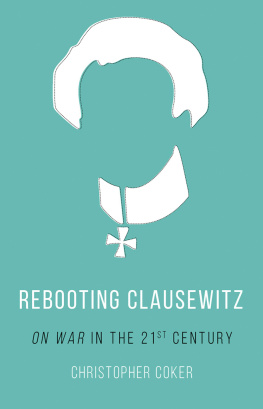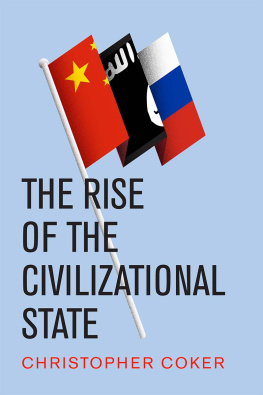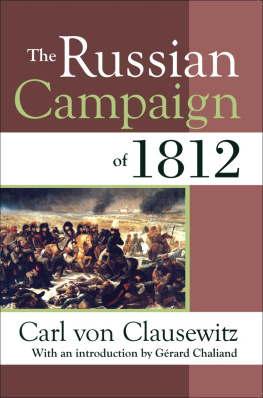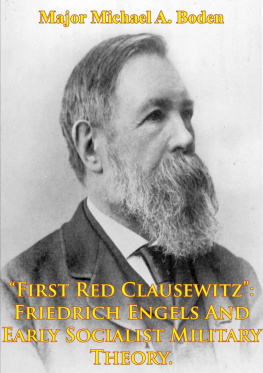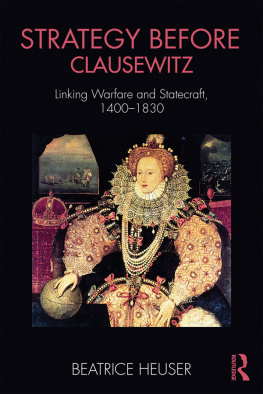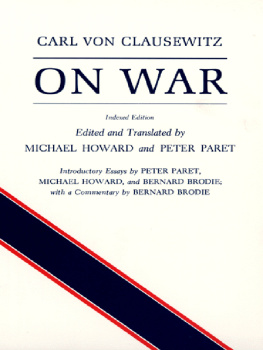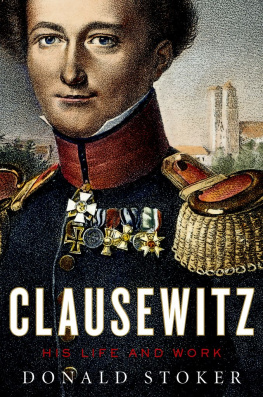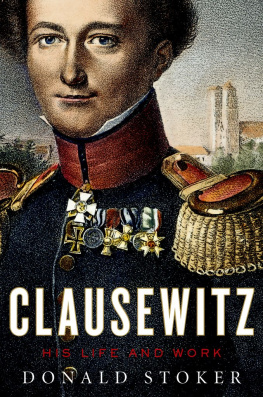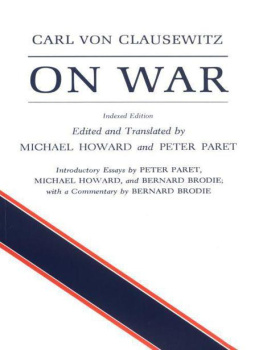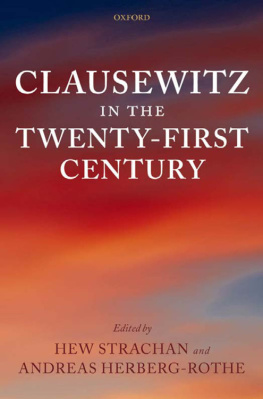REBOOTING CLAUSEWITZ
CHRISTOPHER COKER
Rebooting Clausewitz
On War in the Twenty-First Century


Oxford University Press is a department of the University of Oxford. It furthers the Universitys objective of excellence in research, scholarship, and education by publishing worldwide.
OxfordNew York
AucklandCape TownDar es SalaamHong KongKarachi
Kuala LumpurMadridMelbourneMexico CityNairobi
New DelhiShanghaiTaipeiToronto
With offices in ArgentinaAustriaBrazilChileCzech RepublicFranceGreece
GuatemalaHungaryItalyJapanPolandPortugalSingaporeSouth KoreaSwitzerlandThailandTurkeyUkraineVietnam
Oxford is a registered trade mark of Oxford University Press in the UK and certain other countries.
Published in the United States of America by Oxford University Press
198 Madison Avenue, New York, NY 10016
Copyright Christopher Coker 2017
All rights reserved. No part of this publication may be reproduced, stored in a retrieval system, or transmitted, in any form or by any means, without the prior permission in writing of Oxford University Press, or as expressly permitted by law, by license, or under terms agreed with the appropriate reproduction rights organization. Inquiries concerning reproduction outside the scope of the above should be sent to the Rights Department, Oxford University Press, at the address above.
You must not circulate this work in any other form and you must impose this same condition on any acquirer.
Library of Congress Cataloging-in-Publication Data is available Christopher Coker.
Rebooting Clausewitz: On War in the Twenty-First Century.
ISBN: 9780190656539
For My Students
CONTENTS
REASSURING COMMENTS ON CLAUSEWITZ FROM THE DEPARTMENT OF DEFENSE TO THE HOUSE APPROPRIATIONS COMMITTEE THURSDAY
13 MARCH 1997
SECURITY ASSISTANCE FOUND AT URL:
http://commdocs.house.gov/committees/approps/hapfoppar2.000/hapfoppar2_0.HTM
Mr Callahan: Thank you very much. What is it when you say, to paraphrase Clausewitz? What is that? What is Clausewitz?
Mr Slocombe (Under Secretary of Defense for Policy): Clausewitz said that war is the continuation of policy by other means. I believe for the kind of programs which support our interests by non-military methods that are involved in this bill are the expression of national strategy by other means. These are not hand-outs to foreign countries as an act of charity.
Mr Callahan: Well, youll have to forgive me.
Mr Slocombe: I apologise for the analogy, which is obscure.
Mr Callahan: Well, I mean, I never heard of Clausewitz. Maybe I havent studied my history sufficiently.
Mr Slocombe: Clausewitz was a German general who
Mr Callahan: I figured that.
Mr Slocombe: The book, I have to say, is impenetrable, but I think the only part of it which anybody has read is the one line that, war is the continuation of policy by other means.
LIFE STORY
CARL PHILIPP GOTTLIEB VON CLAUSEWITZ
Born: 1 July 1780. Died: Aged 51 on 16 November 1831.
Educated: 1792Prussian Army. Saw combat at the age of 13.
Marital Status: Married 1810 to Countess Marie von Brhl.
Works:On War; various essays.
Influences: Kant, Hegel? Scharnhorst.
Claims of Plagiarism: From Otto August Rhle von Lilienstern.
Movie appearances:The Jaywalkers (1959), Cross of Iron (1977), Crimson Tide (1995), Monty Python and the Holy Grail (1975), Lions for Lambs (2007).
His Admirers Say:
Remembering Clausewitz makes you take your own thoughts a little less seriously. (Bob Dylan, 2004)
His Critics Say:
Enough! It is time to hold a wake so that strategists can pay their respects to Clausewitz and move on leaving him to rest among the historians. (Steven Metz, 1994)
He Says:
Half against my will I have become a Professor. (Paret 2015, p. 100)
The Best Thing Said About Him:
Clausewitz is not holy writ, only canon law. (Colin Gray)
Clausewitz to go
A group of students discussing Clausewitz around a seminar table:
Student A: Oh, for Christs sake, not Clausewitz again? He is a historical fossilits all Napoleon worship and decisive battles and Great Power wars. It is all so retro.
Student B: But who else is there?
Student A: Well there is Sun Tzu. And the future belongs to the Chinese doesnt it? Who wants to read what a nineteenth century German has to write about war.
Student C: And try reading his book. Its so long.
Student B: Yeah, and whats with all the fuss the professors make about his theory? It is not as though it is focussed.. like, its all over the place.
Student C: Anyway, if he is so fucking smart why is he so fucking dead?
OK, I have made this dialogue up; I didnt overhear it, but I might have done. I have heard all of these objections in the space of thirty-five years of teaching (though they tend to be voiced more often these days). And perhaps the conversation is more than a little contrived. Intellectually, these imagined students are clearly not the sharpest tools in the box but they are not entirely unrepresentative of student opinion either. TL, DR: Too Long, Didnt Read is the cri de coeur of student life as professors know from many other disciplines. And On War is a very long book. Clausewitzs stodgy sentences dont always translate themselves from the nineteenth century page to the twenty-first century mind with ease. Besides which, if a reader and author have to coexist, we are cut off from one another by differing and often mutually exclusive perceptions of the worldovercome only, if at all, through enormous imaginative effort.
And what of the last line of my imagined dialogue (the killer argument for our sceptical young student)? Some readers will recall that it appears in John Hustons 1985 film Prizzis Honor. The remark is made about a dead hit-man; what has it got to do with a writer who has been dead for nearly two centuries? Dont dead authors appear on university syllabuses all the time even when there are moves, as there are at my own, to update the courses? For many students who find the canon too dated or boring, a writers personal check-out date is almost equivalent to the sell-by date of his greatest work. The question the student should have asked is this: if a writer is long since dead, how smart is it of us to continue reading him? Although such thinking might be considered intensely shallow if we are discussing the great works of fiction, when it comes to non-fiction even the great books tend to have a much more limited shelf-life. Moreover in the case of war in which people really do end up dead then the question is not quite as outlandish as it may seem. What does a superannuated nineteenth century Prussian general still have to tell us about the wars we fight today?
It is also a mark of the times to build people up and then tear them down. Reputations come and go; celebrities quickly fall out of fashion. It is the norm to treat even our most revered contemporary writers as celebrities who one day will eventually fall out of fashion, and to dismiss works of the past as classics in need of revision. Roll over Clausewitz, wrote one so-called expert in an endorsement of a book by Martin Shaw,

